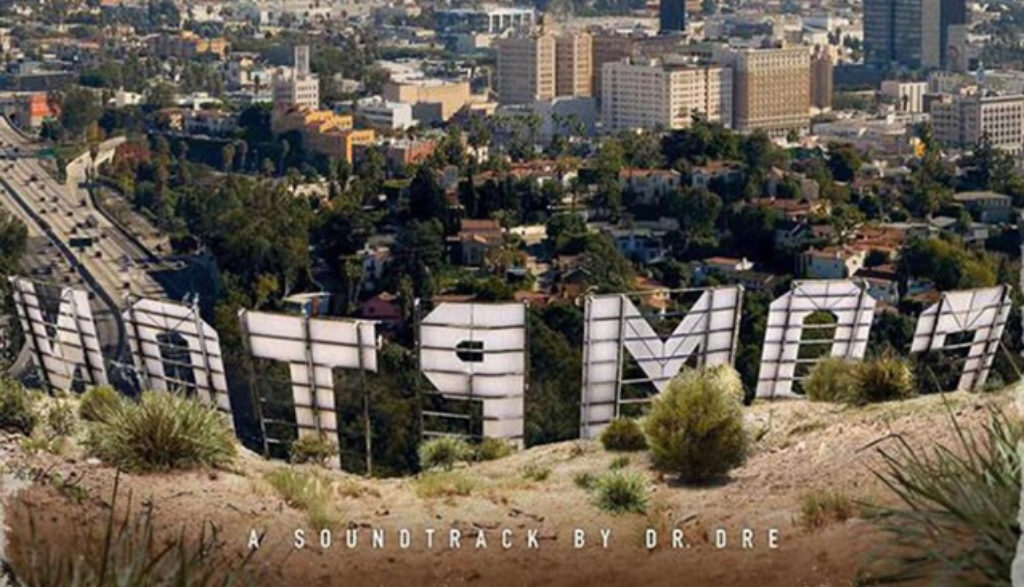
Many rappers have claimed to own the hip-hop throne. (Jay Z and Kanye West come quickly to mind.) But few have influenced the genre’s overall trajectory the way Andre Young has.
You might know him as Dr. Dre.
Compton is the rap mastermind’s first album in 16 years and only his third solo effort. (He says it will be his last.) But don’t be fooled by that seemingly modest output. A founding member of N.W.A., Dr. Dre has helped launch some of hip-hop’s heaviest hitters, including Snoop Dogg, 50 Cent and Eminem.
As Compton’s title suggests, this effort serves as an homage to the South Central Los Angeles suburb that put Dre on the map back in 1988. Straight Outta Compton was the title of N.W.A.’s incendiary, violent gangsta rap debut, the story of which has once again exploded like a grenade lobbed into the middle of pop culture thanks to the recent biopic of the same name.
When the determined Dr. and his N.W.A. cohorts first burst onto the scene, they were desperate, hungry, impoverished unknowns who confrontationally chronicled the injustices they witnessed in Compton’s mean streets. Nearly 30 years later, Dre is worth an estimated $550 million. He’s a mogul. The ultimate insider. A rap kingmaker. But to listen to him spit, you wouldn’t know he’s changed a bit. “F— the money, yo. This s— could never change me,” he insists on “Issues,” testifying that he’s still a “n-gga with an attitude, still gettin’ active.”
He says that’s a full-on good thing.
“Intro” begins with a spoken-word lament about how Compton, once considered the cradle of “the Black American Dream,” quickly degenerated into poverty and violence. Dem Jointz confirms that diagnosis on “Issues,” appropriating the opening lines of a familiar childhood prayer: “Now I lay me down/And wake up to gunshots in this crazy town.”
On “Medicine Man,” Dre disapproves of “Girls be 13 acting 22.” Internet addiction (and probably porn addiction, too) prompts him to rap, “Married to the Internet, stuck in place, salivatin’/Ain’t nobody graduatin’.” He also thinks teachers are grossly undercompensated. All these problems combined, he reports later, constitute something “looking like a sign of the Revelation.”
Anderson .Paak rightly raps, “Got a son of my own, look him right in the eyes/I ain’t living in fear, but I’m holding him tight.” And “All in a Day’s Work” finds several guest artists singing and rapping the praises of hard work, with a voice-over from Jimmy Iovine giving instruction on how to harness fear constructively. Dre criticizes reality TV and the Real Housewives franchise.
Jill Scott’s chorus on “For the Love of Money” echoes 1 Timothy 6:10: “Want that, need that/Root of all evil, mayne.” On “Satisfiction,” Dr. Dre playfully mocks the kinds of bling-laden lyrics that often show up in rap songs (“Yeah, I mean, I listen to these rap records/half the time I’m suspicious/You n-ggas sound so fictitious”).
On “Talk About It,” Dr. Dre declares, “But Andre young enough to still get involved/And Andre still young enough to say ‘f— y’all/F— you, f— you and you on the corner too.'” Kendrick Lamar pushes similar sentiments further when he echoes, “My discretion, f— your blessing, f— your life/F— your hope, f— your mamma/F— your daddy/F— your dead homie/F— the world up when we came up, that’s Compton, homie!”
It should go without saying at this point—but I’ll say it anyway—that nearly every song includes that kind of obscenity.
“Genocide” finds Candice Pillay singing (in reggae style) about her father’s murderous ways (“My Daddy done killed a b—/Went and put that dome to her head/My Daddy done killa you”). On “One Shot One Kill,” Jon Conner raps, “I came here to raise h—, I can’t lie/One shot, one kill, it’s real, I ain’t hidin’/ … You are now not in the presence of nice guys.” Indeed. “Deep Water” includes lyrics that sound as if a man is drowning while others refuse to help. And among the many horrific lines on his “vintage” contribution to “Medicine Man,” Eminem brags about rape being pleasurable for his victims.
More sex mingled with violence—and callously committed murder—turns up on “Loose Cannons.” “Genocide” also includes a line bragging about sexual conquests. “It’s All on Me” mixes and mingles drugs, dealers and strippers. King Mez alludes to a pile of cocaine next to a Bible on “Darkside/Gone.” We hear references to marijuana, crack and Hennessy.
Dr. Dre isn’t 23 anymore. He’s 50. And he’s long since gotten straight outta Compton, trading the ‘hood for $40 million digs in Brentwood. But he’s still in love with “making parents live in fear.” Why should we care? Like Dre says, “I just wanna make it clear/My influence run deep like the ocean.”
He’s dead right about his influence. He’s got it. And he’s consistently exercised it in rash and brash, unwise and obscene ways for nearly 30 years now.
Some might argue that he’s used that influence to call positive attention to racial injustice. And I won’t say he never has. Alas, legitimate moments of constructive social commentary on Compton haphazardly float like flecks of flotsam amid stormy lyrics laced with vulgar vitriol and violent, indiscriminate rage.
No, not completely indiscriminate. All too often this king hurls it at his sexual subjects, or women in general. The result is an awful album that pretends the last 27 years never happened as Dre enlists a small army of like-minded guests to blast away with their spit-powered shotguns, pelting a crowd of innocents—with predictable consequences.


After serving as an associate editor at NavPress’ Discipleship Journal and consulting editor for Current Thoughts and Trends, Adam now oversees the editing and publishing of Plugged In’s reviews as the site’s director. He and his wife, Jennifer, have three children. In their free time, the Holzes enjoy playing games, a variety of musical instruments, swimming and … watching movies.